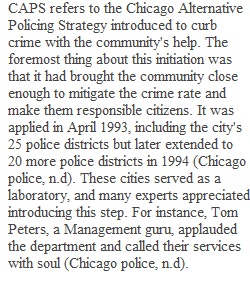


Q Instructions: ? The Discussion Rubric explains how you will be graded. ? The discussions combined are worth 25% of your final grade. Created in 1993 and once considered to be at the forefront of community policing, the Chicago Alternative Policing Strategy (CAPS) has fallen under criticism for ineffectiveness in the wake of rising homicide numbers and poor community relations. Prepare for this discussion by reading: • Chicago Police (n.d.). What is CAPS? (Links to an external site.) • Cardona, M. (2019). The Rise and Fall of Community Policing in Chicago. Chicago Reader • Bidou, A. (2016). Community Relations are a Two-Way Street. National Police Foundation Reflect and Respond. In your discussion post this week, address the following questions. • What contributed to the initial success of CAPS? • What contributed to the identified failures of CAPS? • What steps would you recommend to resuscitate, revive, or replace CAPS to renew a successful commitment to community policing in Chicago? ________________________________________ After reading the assigned materials, you will respond to the following Discussion Question using no less than 200 words, no later than Thursday of each week. Remember to use APA citations, and reference your sources, upon which you have based your answer. You will then respond to at least two of your classmates’ discussions with a substantial post, addressing your thoughts on their ideas and furthering the discussions. Each response post must be at least 100 words and use APA citations and references where needed.
View Related Questions